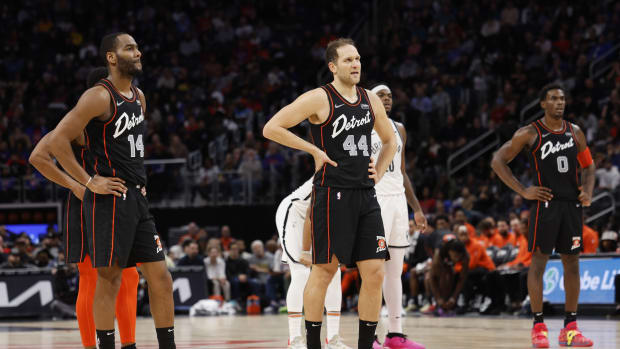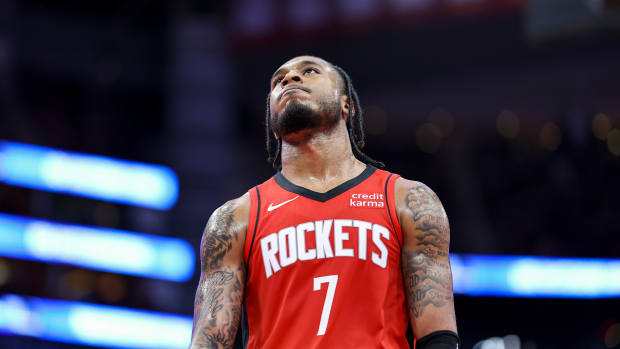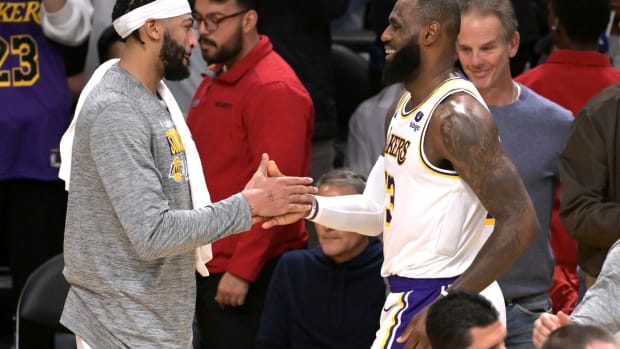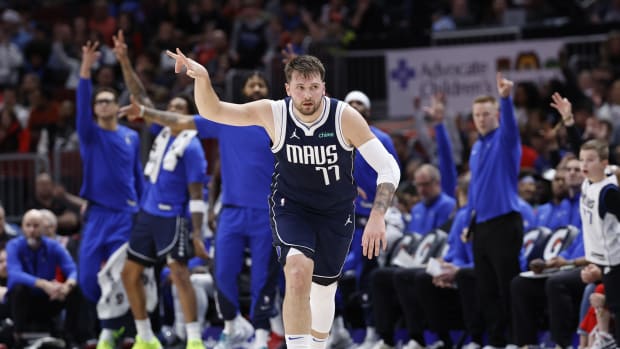Tobias Harris and the Sixers Are One of NBA's Toughest Puzzles to Crack
There is no puzzle in the NBA quite like the Philadelphia 76ers, whose size alone makes any traditional attempt at solution impossible. Since trading for Tobias Harris last week, the Sixers start just one player shorter than 6'8". The only matchup actually fit for a guard is with J.J. Redick. Take it and you’ll be spared no punishment; keeping up with Redick means racing at full speed into screen after screen, a bruising encounter with the very giants an opponent might try to avoid. Some smart, physical forward will also have to contend with Ben Simmons, and another with Jimmy Butler, and another, now, with Harris. Already we’ve run far afield of what is actually feasible for most teams, and that’s before broaching the subject of who will guard the game’s most imposing post player.
SHARP: Harris Trade Gives 76ers Some Butler Insurance
Both the Nuggets and Lakers (the only teams to play against the new-look Sixers thus far) were flummoxed. Many of the tricks teams usually try to keep Philly in check short-circuited almost immediately. Harris was one threat too many—just the kind of versatile forward to break down a tilting defense or shoot over the top of any delay in rotation. It was clear at the the time of the trade that the Sixers’ avant garde starting lineup would be one of the most uniquely challenging covers in the league. Less evident was what, exactly, trading away three rotation players might do to one of the shallowest teams in the league. Philadelphia’s starting lineup was already dominant as it was. What cost the Sixers, more often than not, were the minutes doled out to nondescript role players.
Some 30-35 of those minutes will now go to Harris. The effects of this have thus far been rather profound; adding another creator to the rotation makes every role player in the mix that much more viable. T.J. McConnell, who had a season-long plus-minus of -22 in 1,015 minutes before the trade, has been +22 in his 33 minutes since. It isn’t McConnell that’s changed, but everything around him. Against the Lakers on Sunday, Sixers coach Brett Brown was able to keep Harris on the floor in spots where he would previously lean on Butler, which later allowed Butler to supplement different combinations of teammates. The lineup that actually broke the game open wasn’t the loaded starting rotation. It featured Butler, Redick, and Joel Embiid, but also McConnell and new Sixer Mike Scott, who came over in the deal for Harris.
There can be no real trend in the course of two games—only a start. We have yet to see how opponents will respond to the Sixers, tactically, when there’s enough of their play on film to more fully comprehend the way they play, and we have yet to see how the Sixers will respond to that response. Even this early flicker, however, is worth noting. Philly’s biggest, most glaring problem this season has been its lack of depth. It was a subtle form of self-sabotage. Being short a few scorers had nudged Embiid into more turnovers than usual. It had made Simmons’s reluctance to shoot that much more pronounced. Defenders could double Redick whenever he used the screen of a lesser threat, tilting the math at the core of the offense.
Harris, in particular, helps bring so many of those microdynamics back to balance. With the ball, he can press and improvise in a way that many Sixers (Simmons and Redick included) can’t. Without it, he forces the defense to bend in his direction just by properly spacing the floor. Harris isn’t a shooter in the way that, say, Mike Muscala was a shooter. Only two other stretch bigs in the league this season (Davis Bertans and Danilo Gallinari) average as many made threes at as high a shooting percentage as Harris. Teams can sometimes fake the impact of a stretch four by having a decent enough shooter with the willingness to fire away. Harris is the real deal, though perhaps even that may oversimplify his contributions.
Few forwards of any kind are so successful in playing “random basketball.” You can run a play to set up Harris, or to use him as a decoy. You can also trust that when the action breaks down, Harris can find and attack openings in decisive fashion. The only way a team can survive in the playoffs is by finding ways to execute when things get weird. And with the Sixers, in particular, things tend to get weird rather often—a natural side effect of fielding lineups that no one knows quite how to match up with. Think of Harris as the penalty for cross-matching against the Sixers. Opposing teams have to get creative against Philly to stay alive, but the fact that Harris can work over most guards and drive past most bigs denies them a crucial coping mechanism.
Adding Scott, too, has been an early boon for the Sixers. His contributions are thematically similar to what Marco Belinelli brought Philly in the playoffs last season. Their roles and skill sets are obviously quite different. Yet there can be a simple, understated appeal to a player who shoots first and asks questions later, particularly when grounded by an otherwise methodical offense. There are times—and there are lineups—where the Sixers just need someone willing to take a quick shot when the opportunity presents itself. Scott is all too happy to oblige, and in doing so distinguishes himself from the Wilson Chandler types.
SHARP: And Then DeMarcus Cousins Was on the Warriors
Scott doesn’t have to be perfect to help the Sixers. Whatever lineup he plays in will likely feature three very good players, among them a genuinely dominant center, a clever playmaker, a shooter who can carry an offense, and two big forwards with expansive games. All Scott needs to do—or James Ennis, or Boban Marjanović, or Furkan Korkmaz—is keep things moving. Make quick decisions. Knock down a few shots. Hold down a defensive assignment. It all can be so simple when there are now five Sixers of starring quality, and yet desperately needed. The counterintuitive truth of being a role player is that you will never be more visible than when surrounded by talent: when your every miss and limitation falls back, in some way, on a star teammate. Philadelphia has tried to stack the deck against that possibility, adding to the peak of a top-heavy roster in the hope that it spills over.



































